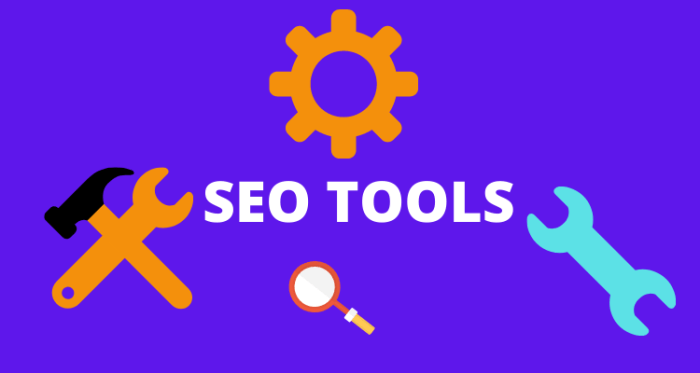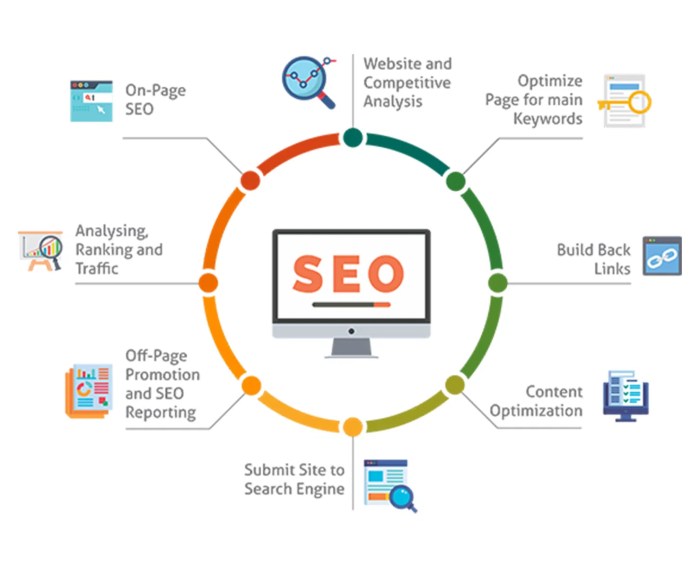Using SEO Tools – Using Tools, let’s dive into the world of digital marketing where these tools play a crucial role in boosting online presence and visibility. Whether you’re a seasoned pro or just starting out, understanding the power of tools is key to staying ahead in the game.
In this guide, we’ll explore different types of tools, from on-page to off-page and technical tools, along with analytics tools that help you measure and track your performance effectively.
Overview of Tools
tools are essential in the world of digital marketing as they help businesses optimize their online presence and improve their search engine rankings. These tools provide valuable insights, data, and analysis to help professionals make informed decisions and drive traffic to their websites.
Types of Tools
There are various types of tools available in the market, each serving a specific purpose in optimizing a website for search engines. Some of the most common types of tools include:
- Research Tools: Tools like Google Planner, SEMrush, and Ahrefs help identify relevant s that users are searching for.
- On-Page Tools: Tools such as Yoast and Moz Pro assist in optimizing website content, meta tags, and headings for better search engine visibility.
- Link Building Tools: Tools like BuzzStream and Ahrefs help in managing and monitoring backlinks to improve website authority.
- Rank Tracking Tools: Tools such as SEMrush and Serpstat track rankings and monitor changes in search engine results pages (SERPs).
- Technical Tools: Tools like Screaming Frog and Google Search Console help in identifying technical issues that may affect website performance and indexing.
These tools work together to provide a comprehensive strategy for businesses looking to improve their online visibility and attract more organic traffic.
On-Page Tools
On-page tools are essential for optimizing website content to improve search engine rankings. These tools help website owners analyze and improve various on-page factors that impact , such as usage, meta tags, internal linking, and content quality.
Functionality of On-Page Tools
On-page tools offer a range of functionalities to help website owners improve their on-page optimization efforts. Some common functionalities include:
- analysis: Tools like SEMrush and Moz allow users to research and analyze s to target in their content.
- Content optimization: Yoast and Rank Math provide suggestions for optimizing content based on best practices.
- Meta tag management: Tools like Screaming Frog help users analyze and optimize meta tags for better search engine visibility.
Comparison of On-Page Tools
There are several on-page tools available in the market, each with its unique features and functionalities. Here is a comparison of some popular tools:
| Tool | Features | Price |
|---|---|---|
| SEMrush | research, content optimization, site audit | Paid plans starting at $99.95/month |
| Yoast | Content analysis, readability check, meta tag management | Free basic version, premium plans available |
| Moz | research, site crawl, link analysis | Paid plans starting at $99/month |
Optimizing Website Content with On-Page Tools, Using SEO Tools
On-page tools play a crucial role in optimizing website content for better search engine visibility. For example:
- Using analysis tools to identify relevant s to target in website content.
- Utilizing content optimization tools to improve the quality and relevance of on-page content.
- Leveraging meta tag management tools to optimize meta titles and descriptions for higher click-through rates.
Off-Page Tools

Off-Page tools play a crucial role in enhancing a website’s visibility and improving its search engine rankings. These tools focus on optimizing factors outside of the website itself, such as building quality backlinks and increasing online presence.
Key Features of Effective Off-Page Tools
- Backlink Analysis: Tools that help identify and analyze backlinks to ensure they are from reputable sources and relevant to the website’s content.
- Social Media Monitoring: Tools that track social media mentions, engagement, and overall social presence to leverage for purposes.
- Competitor Analysis: Tools that provide insights into competitors’ backlink profiles, strategies, and overall online presence to identify opportunities for improvement.
- Content Promotion: Tools that aid in promoting and distributing content across various platforms to attract more traffic and backlinks.
How Off-Page Tools Contribute to Link Building Strategies
Off-Page tools contribute to link building strategies by providing valuable data and insights that help in acquiring high-quality backlinks. These tools help in identifying potential link opportunities, monitoring link quality, and analyzing competitor backlink profiles. By leveraging these tools effectively, website owners can enhance their link building efforts and improve their search engine rankings over time.
Technical Tools: Using SEO Tools

When it comes to optimizing a website for search engines, technical tools play a crucial role in ensuring that the site is performing at its best. These tools help in analyzing and improving various technical aspects of a website that can impact its visibility and ranking on search engine results pages.
Significance of Technical Tools
- They help identify and fix issues that may be affecting site performance, such as broken links, duplicate content, and slow page speed.
- Technical tools ensure that the site is easily crawlable and indexable by search engines, leading to better visibility.
- They help in optimizing metadata, structured data, and XML sitemaps for improved search engine rankings.
Functions of Technical Tools in Enhancing Site Structure
- Site Audit: Tools like SEMrush and Screaming Frog help in conducting comprehensive audits to identify technical issues that need to be addressed.
- Page Speed Analysis: Tools like Google PageSpeed Insights and GTmetrix analyze website speed performance and provide recommendations for improvement.
- Structured Data Testing: Tools like Google’s Structured Data Testing Tool ensure that structured data is correctly implemented on the website for enhanced search results appearance.
Examples of Technical Tools for Site Audit and Optimization
- SEMrush: Provides in-depth site audits, research, and backlink analysis to improve overall performance.
- Screaming Frog: Crawl website URLs and analyze key technical and onsite elements to identify areas for improvement.
- Google Search Console: Monitor website performance, indexation status, and receive alerts for technical issues that need to be resolved.
Analytics Tools
analytics tools play a crucial role in measuring the performance of strategies. These tools provide valuable insights into website traffic, user behavior, and performance, helping businesses make informed decisions to improve their search engine rankings.
Key Metrics Tracked by Analytics Tools
- Organic Traffic: The number of visitors coming to your website through organic search results.
- Rankings: Monitoring the positions of your target s in search engine results pages.
- Click-Through Rate (CTR): Percentage of users who click on your website link after seeing it in search results.
- Conversion Rate: The percentage of website visitors who complete a desired action, such as making a purchase or filling out a form.
- Bounce Rate: The percentage of visitors who leave your website after viewing only one page.
How Analytics Tools Help in Making Data-Driven Decisions
analytics tools provide actionable data that can guide decision-making processes. By analyzing key metrics such as organic traffic, rankings, and user behavior, businesses can identify areas for improvement and optimize their strategies accordingly. These tools help in understanding the effectiveness of efforts and making informed decisions to drive organic traffic and improve search engine visibility.